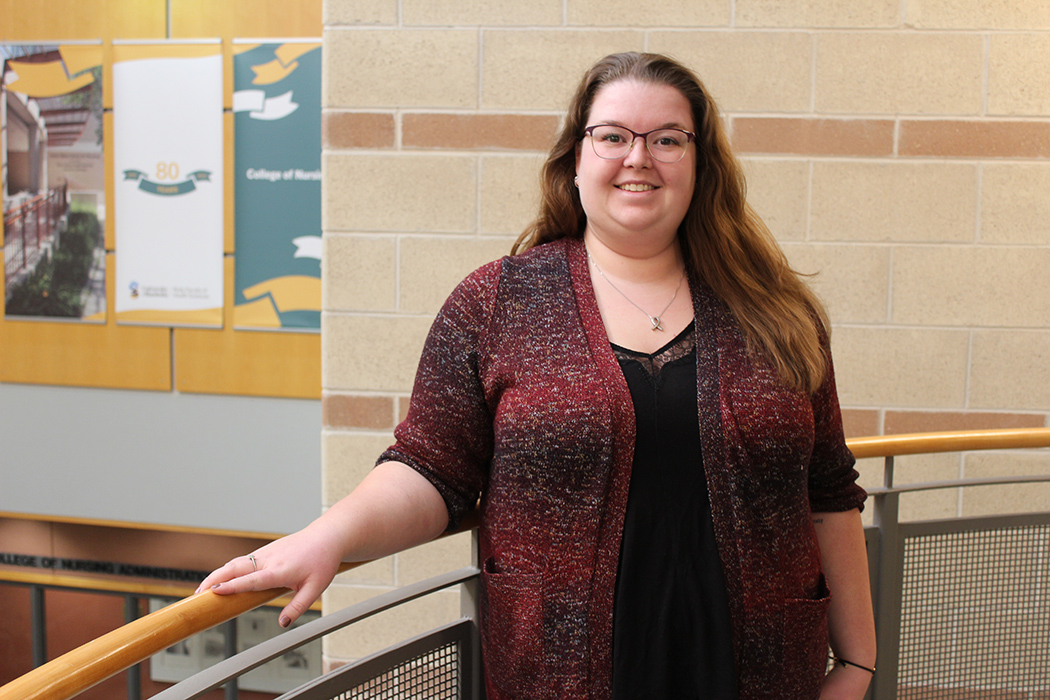
Rady grad student profile: Michaela Bourque inspired by personal health journey
When Michaela Bourque was 17, she was diagnosed with acute myeloid leukemia, starting her on a health journey that had a profound impact on her emerging career as a researcher.
Bourque, 26, is working toward an interdisciplinary PhD in nursing and psychology. Her work is focused on the effects of cancer-related labels and language on adolescents and young adults who have had a cancer diagnosis.
Originally from New Brunswick, Bourque has an undergraduate degree in psychology from Crandall University and a master’s degree in psychiatry from McGill University.
Earlier this year, she received $210,000 over four years as part of the Canadian Cancer Society’s new master’s and PhD training awards competition. The organization awarded $3.34 million to 16 master’s students and 17 PhD students across eight provinces.
UM Today spoke with Bourque about her journey and passion for her research.
Can you describe your research and why you see it as important?
My research focuses on cancer-related language. One significant aspect involves re-evaluating terms like “survivor” or “fighter” to ensure they are more inclusive, recognizing that not everyone identifies with these titles during their cancer journey. I aim to foster language that respects the diverse range of individual experiences.
I’d like to carve out a dedicated space in cancer research that specifically delves into the unique experiences and psychosocial needs of adolescents and young adults. Recognizing the distinct challenges faced by this demographic is crucial for tailoring effective and empathetic support systems. Ultimately, the aim is to contribute to a more compassionate, responsive and supportive health-care environment for them.
What inspired you to pursue your field of study?
My own health journey is the fuel behind my decision to dive into research. Going through my own challenges made me realize the struggles others face, and I want to do something about it. I’m driven to find insights and solutions that can genuinely help people dealing with health issues like mine. Through research, I hope to turn my personal insights into something practical and positive.
What motivates you to do the work you do?
I’m genuinely driven by the idea of creating a positive impact in the world and seeing real, meaningful changes unfold. I am constantly brainstorming ways to make a difference in someone’s life. I view research as this incredible tool, not just for academics but for shaking things up in health care and enhancing the experiences of patients. My goal isn’t just to talk about change, but to ignite genuine, positive transformations that resonate with people on a personal and heartfelt level.
Why did you choose UM for your PhD?
There were a few reasons. First, I was lucky to connect with several faculty members, including my supervisor and committee members, who were excited about my work and ready to support me in my education and research. The College of Nursing houses many prominent academics at a number of phases in their careers, all of whom are ready to support grad students where possible. I was also excited about the opportunity to study and conduct research in an environment that values interdisciplinary education, as my project mixes the disciplines of nursing and psychology.
UM’s intimate and close-knit educational setting was also a factor. The prospect of more personalized interactions with professors and the opportunity to develop meaningful relationships with fellow students aligns with my preference for a more collaborative and engaging academic environment.
What are your future plans?
I envision a future where I continue to immerse myself in the world of research. The idea of potentially stepping into a teaching role at a university also holds appeal. I also see a potential avenue in applying my expertise within health-care networks. The prospect of being a catalyst for positive shifts in health care, where my research can directly influence and enhance the well-being of individuals navigating the system, is a driving force in my aspirations.
This Q&A is part of a series on UM Today featuring Rady Faculty of Health Sciences graduate students. You can find more grad student profiles here: #Radygradstudents.






